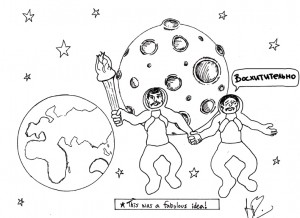What do the Sochi Olympics really cost?
Torch on the moon and the problems with the Russian hosts
Bobby Danger Jones
Sports Editor
Russia has a big reputation to uphold and they have delivered so far on the way to the Sochi Winter Olympics in Feb. 2014. According to the Moscow Times, the Sochi Games have already bagged a world record for the most spent on an Olympic event ever.
The total cost is forecasted at 1.5 trillion rubles ($50 billion USD) in private and state investment. Three quarters of that sum has already been spent on sport and road infrastructure since 2008, according to figures released by the governmental commission overseeing preparations.
200 billion rubles went into sports infrastructure construction, while upgrading city infrastructure cost an additional 500 billion rubles.

Russian astronaut holds the torch as he and his crew member return from their Olympic mission to space. Photo Courtesy: Facebook
The staggering $50 billion price tag is an astonishing 25 times higher then what was spent in Vancouver on the 2010 games, which was predicted at $1.8 billion but was actually closer to $2.5 billion, after findings from a study conducted by PricewaterhouseCoopers.
Sochi also overtakes the Beijing Summer Games of 2008, which cost $40 billion and had, until now, been the most expensive Olympics.
85 percent of Sochi’s new infrastructure was built from scratch. Four presidential changes in four years within the cooperation in charge of the project has been detrimental to progress.
The truth is, the figures have risen four times since Vladmir Putin won the games and pledged a “modest” $12 billion to develop Sochi into a world-class winter sports complex. The government has countered criticism surrounding spending by releasing figures showing private investments reaching 1 trillion rubles; but rumours of inflated costs and corruption are too obvious to ignore.
Besides corruption, many issues have also been raised over future use of the new facilities. Critics say the Olympic venues risk becoming “white elephants”, not least of all because prices in Sochi and the surrounding resorts are too high to be competitive with alternatives in Turkey and Europe.
Putin has said he wants visa-free travel with European Union member countries in time for the games, but EU officials have dashed those hopes, saying that negotiations may not even begin before 2014.
Olympic Torch Relay
The 2014 Sochi Olympic Torch relay is (of course) the longest and most ambitious in history ever ran for an Olympic event. A grandiose effort of 123 days, 65,000 kilometers and 14,000 torchbearers has definitely come with some highs as well as some blooper-like scenarios.
Some highlight of the journey thus far include: the torch’s space walk outside the International Space Station, a swim in the world’s largest freshwater lake (specially lit), a trip to the frigid North Pole and the oldest torchbearer to ever run. At the age of 101, Alexander Kaptarenko has practiced for the relay by walking through the town of Novosibirsk with a frozen salmon to mimic the weight of the torch.
Some lows of the journey have included incidents of the torch burning too fiercely and recently, igniting torch bearer Pytor Makarchuk. The former Olympic bobsledder was running with the torch in Siberia and as it began to leak fuel the fire leapt from the torch and onto his left sleeve. His arm was quickly extinguished by a relay assistant. Makarchuk was unscathed but became the second living torch of the relay. In late October, a 13-year-old volunteer was burnt when the torch began spitting flames until it was engulfed completely.
The torch has also had issues staying lit and has been extinguished dozens of times: 44 by journalist Yulia Latynina’s count, and according to Dozhd television, the flame went out eight times in the first six weeks of the journey. The most embarrassing moment came when the flame went out just minutes after being handed to Putin and hoisted in Red Square. Russian Olympian Shavarsh Karapetyan slowed her pace along the Kremlin walls while a security agent relit the torch—not with the flame carried from the Temple of Hera in Greece, but a zippo. Zippo tried to capitalize on this blunder by tweeting the picture, but quickly disbanded the campaign after threats of legal action from the IOC.
Sochi and Russia’s government will have the world’s attention this February, and hopefully the games will not reflect the issues leading up to them. If Sochi is a failure however, the focus will be on Putin and his decision to spend billions that could have been allocated elsewhere, for example maybe feeding Russia’s impoverished citizens.




